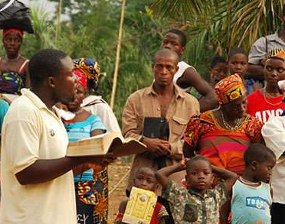A Model for Medical and Dental Missions
 Introduction
Introduction
This article presents a practical model or method for dental and medical evangelism in foreign countries used most effectively to help establish and grow local churches. Of course, it is ultimately God who works in people’s lives to draw them to saving faith in Jesus Christ (John 6:44). No evangelistic formula or technique will save anyone. But God expects us to be wise, prepared, faithful servants when we take the gospel to another country.
The model for effectively using field teams of health professionals discussed below is a proven way to help fulfill our part of the Great Commission as we look to God to work a miracle in people’s hearts to draw them to salvation. Ideally, a missionary or national local church hosting a field team should be involved in all parts of the model. Where it cannot, the field team can fill in some of the gaps. But the best path to success is when national pastors and local church believers actively participate in each step of the process.
Discussion
Wisdom from a Screen?

“You can’t get wisdom from a screen!” My Greek professor made this adamant assertion to a class of young preacher boys in January 1992. He was responding to a question regarding the new Bible study software named Logos. Version 1.0, a forward thinking shareware product designed by two Microsoft employees, had been released in December 1991. Little did my professor know the technological tsunami that would soon pound the cultural landscape in the form of the World Wide Web and its home, the Internet. As with all big waves, some watch, some run, and some grab 12 foot boards and head into the surf.
You might be wondering why I would discuss the Internet and New Communication Technologies (INCT). Isn’t this the 21st century? Isn’t this a tired subject? Am I just transitioning from cassettes to CD’s? There are a few reasons why I think this topic is pertinent. For one, conservative Christians are generally the last adopters of technology because of the fear of the unknown, or a general lack of understanding. Why fix it if ain’t broke? How do I get on The Twitter?
Beyond that, Paul advised that in everything we do, we should have a kingdom purpose in mind, and glorify our great God. I believe this applies to our engagement with INCT. We should have a philosophy and integration of INCT into our worldview.
Discussion
Churches making mainstream films to attract souls
Body
Discussion
"We ought to be bold -and- biblical in our evangelism"
Body
Discussion
The Expansion of Christianity and the Expansion of Islam: Understanding the Differences
 Nineteenth-century Christian missions exploded across the globe with the general expectation that the gospel would penetrate the whole world, and that the evangelism of the world would conceivably be completed within a century or so. That sense of optimism is not so prevalent today, probably in part because of the decline of Christianity in parts of the world that were at one time the fountainhead of Christian faith.
Nineteenth-century Christian missions exploded across the globe with the general expectation that the gospel would penetrate the whole world, and that the evangelism of the world would conceivably be completed within a century or so. That sense of optimism is not so prevalent today, probably in part because of the decline of Christianity in parts of the world that were at one time the fountainhead of Christian faith.
Discussion
"Bible Jim"... is this biblical evangelism?
Body
Discussion
"What is the ultimate goal and motivation for cross-cultural missions, the salvation of as many humans as possible or the glory of God?"
Body
Discussion
Apologetic Methods: What Are They and Can't We Agree?
 Reprinted with permission from Paraklesis (Spring, 2009) courtesy of Baptist Bible College
Reprinted with permission from Paraklesis (Spring, 2009) courtesy of Baptist Bible College
As Christians today, we face a daunting task. More than ever the people who surround us follow the gods of other religions, materialism and secularism, or the Christian God only nominally. The task of making a case for Christ is greater than ever.
But when we turn to books on defending the faith we wonder at all the disagreement. How can believers who agree on so much doctrine disagree so vehemently over apologetics? We in the ministry have to understand the issues ourselves so we can help our people interact with apologetic writings and defend their Christian faith. If there is a mist in the pulpit, there will certainly be a fog in the pews.
Defining Apologetics
Apologetics is the defense of the Christian faith. But how should we do it? Should we go positive or negative? Negative apologetics refutes charges against our faith, while positive apologetics makes a case for our faith. Should we be hard or soft? Can we prove our case for the faith (hard), or only show it probable (soft)? Consequently, can a person rationally reject Christ (soft), or is he being irrational (hard)? Is apologetics simply evangelism, or can it include “pre-evangelism”—removing obstacles and preparing the way for the gospel? Is apologetics just for unbelievers, or also helpful for believers?
These are a few areas of debate among apologists. If we don’t understand these issues we’ll be lost when we try to interact with books on apologetics. A recent book examines five apologetic strategies (Steven B .Cowan, ed., Five Views on Apologetics. Grand Rapids: Zondervan, 2000), but we can put them in two broad camps: evidentialism and presuppositionalism.

Discussion